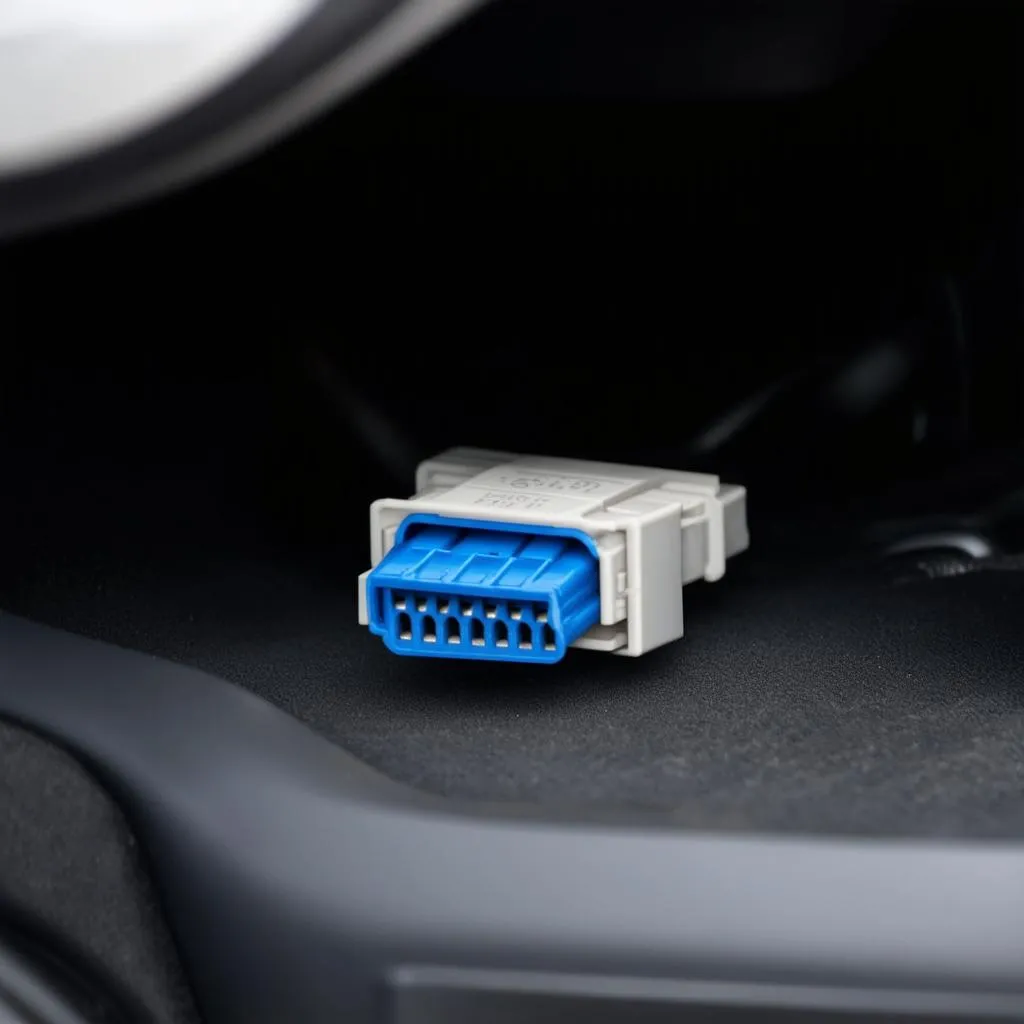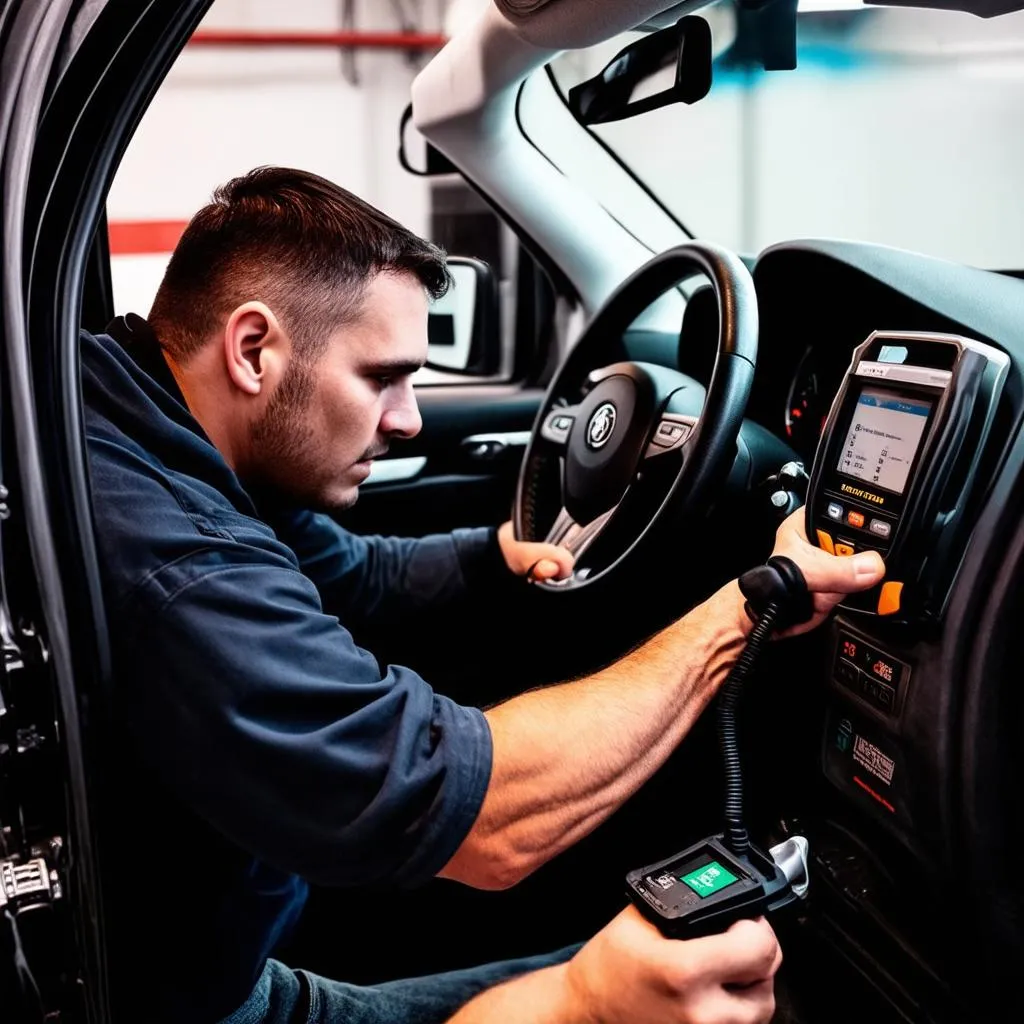Ever felt like your car was speaking a language you didn’t understand? That sudden check engine light, the cryptic codes flashing on your dashboard – it can be frustrating, right? Well, there’s a secret portal into your car’s brain, and it’s called the Obd Diagnostic Connector.
What is an OBD Diagnostic Connector?
Imagine a doctor listening to your heartbeat with a stethoscope. The OBD connector, often located under the driver’s side dashboard, is like a stethoscope for your car. It allows mechanics and DIY enthusiasts to tap into the electronic control unit (ECU), the brain of your vehicle.
But what does OBD stand for? OBD stands for On-Board Diagnostics. Think of it as your car’s internal health monitoring system.
A Brief History Lesson (And Why You Should Care)
Before OBD, diagnosing car problems was like navigating a maze blindfolded. Mechanics relied on experience and intuition, often leading to lengthy and expensive repairs. The introduction of OBD systems, specifically OBD-II in 1996, revolutionized car maintenance. Now, with a standardized connector and diagnostic trouble codes (DTCs), pinpointing problems became significantly easier.
Deciphering the Language of Your Car
The OBD connector is the gateway to a treasure trove of information about your car’s health. By connecting a scan tool or code reader, you can access:
- Diagnostic Trouble Codes (DTCs): These codes, often displayed as a combination of letters and numbers (like P0301), pinpoint specific areas within your car’s systems that are experiencing issues.
- Sensor Data: Ever wondered about your engine temperature, fuel pressure, or oxygen sensor readings? The OBD connector grants access to this live data, helping you monitor your car’s performance in real-time.
Why is the OBD Diagnostic Connector So Important?
For Car Owners:
- Early Problem Detection: Imagine catching a potential engine issue before it becomes a major (and expensive) headache. Regular OBD scans can help you identify problems early on, saving you time, money, and potential breakdowns.
- DIY Empowerment: Feeling empowered to tackle minor car repairs yourself? The OBD connector and a basic code reader can be your allies in understanding and potentially fixing minor issues.
- Transparency and Peace of Mind: Knowing what’s happening under the hood gives you peace of mind, especially when dealing with mechanics. You can walk into a repair shop armed with knowledge about potential issues.
For Mechanics:
- Faster and More Accurate Diagnostics: Gone are the days of guesswork. The OBD connector provides mechanics with precise information, leading to faster and more efficient repairs.
- Access to Advanced Information: Modern scan tools, connected through the OBD port, offer detailed insights into a car’s systems, allowing mechanics to diagnose complex issues effectively.
 OBD Connector Location
OBD Connector Location
Common Questions about OBD Diagnostic Connectors
Here are some questions we often receive from car owners just like you:
1. Where can I find the OBD connector in my car?
While the most common location is under the driver’s side dashboard, the exact location can vary depending on the make and model of your car. Your owner’s manual is the best place to find the exact location.
2. What kind of scan tool do I need for my car?
There’s a wide range of scan tools available, from basic code readers to professional-grade diagnostic tools. The best choice for you depends on your budget and technical expertise.
3. Can I reset the check engine light myself using an OBD scanner?
Yes, most code readers allow you to reset the check engine light. However, it’s important to remember that this doesn’t fix the underlying problem.
 Mechanic Using OBD Scanner
Mechanic Using OBD Scanner
Beyond the Basics: The Future of OBD
The world of OBD is constantly evolving. We’re seeing a rise in:
- Wireless OBD Adapters: These handy devices connect to your car’s OBD port and transmit data wirelessly to your smartphone or tablet, providing you with real-time vehicle diagnostics on the go.
- Telematics and Connected Cars: OBD technology plays a crucial role in the connected car revolution. From tracking your car’s location to monitoring driving behavior for insurance purposes, the possibilities are expanding rapidly.
Need Help with Your Car’s Diagnostics?
Feeling overwhelmed or unsure about tackling car diagnostics yourself? We understand. Cars can be complex. If you need assistance with any aspect of your car’s diagnostics, from understanding error codes to finding the right repair solutions, our team of expert automotive technicians is here to help 24/7.
Contact us on WhatsApp at +84767531508, and let’s get your car back in tip-top shape!
Further Reading:
Explore More:
We’re passionate about helping car owners understand their vehicles better. If you found this article helpful, be sure to share it with your friends and fellow car enthusiasts. And don’t forget to leave a comment below – we’d love to hear your thoughts!
